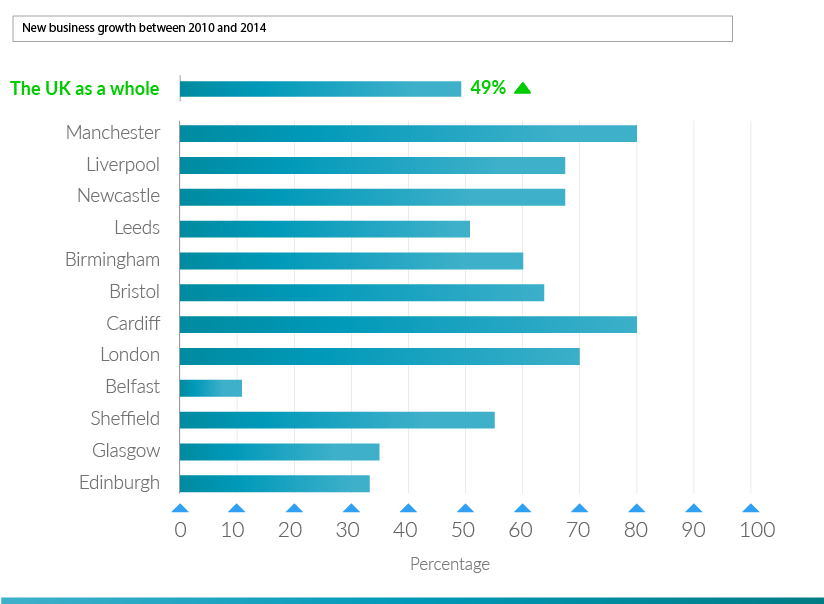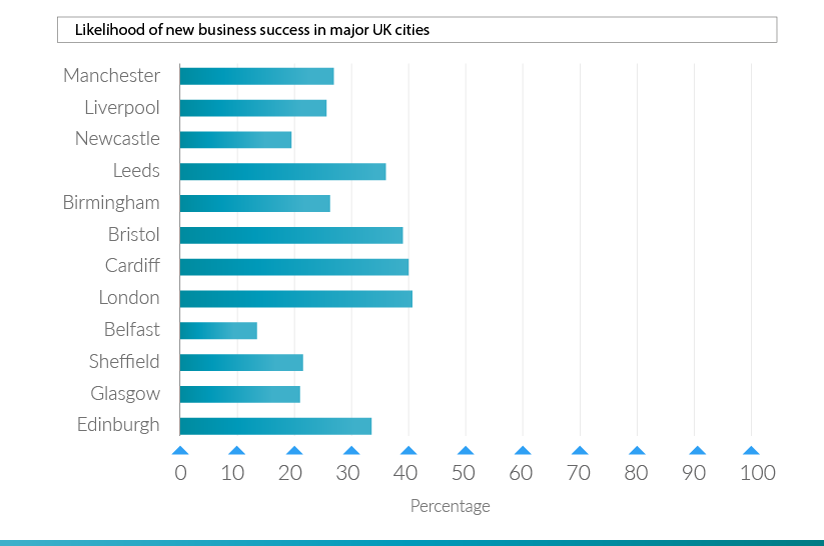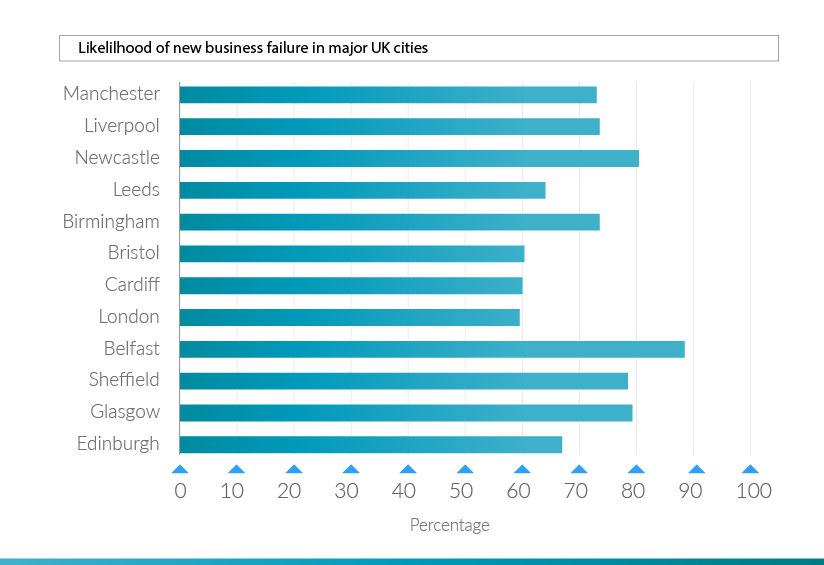Britain's Most Successful And Least Successful Start-Up Cities
Oct 10 2016
Darren Best

Figures from the Office of National Statistics (ONS) reveals that 44% of new UK businesses close within three years - and for the 350,585 new businesses that were born in the UK in 2014, 245,835 established businesses died. What this means is that for every 100 new businesses, 70 existing businesses died – or, to put it another way, 70% of new businesses in the UK ultimately fail.
It’s a shocking statistic – but there are regional variations. For a host of different reasons, some places in the UK offer a brighter business future than others.
For more statistics on Britain’s most and least successful cities, please take a look at the interactive map.
So where in the UK are new businesses least likely to fail?
The criteria chosen to evaluate reasons a business is likely to fail was through business deaths as a percentage of business births (using ONS statistics), which were worked out for all the regions of the UK and major towns and cities. This direct approach doesn’t take into account such factors as the longevity of a closed business or its reasons for closing, both of which contribute to whether it may or may not be termed a ‘successful’ business (itself a relative term); neither does it take into account the size, profit and turnover of any given business, or the overall number of businesses in the area. However, what it does provide is the stark mathematical likelihood of a new business to survive in those regions, towns or cities.
The resulting analysis displayed that London is the most successful region in the UK, with new businesses having a relatively low failure rate of 59%. The next most successful region was Yorkshire and Humber at 66%. The remaining regions all scored in the low 70s, with Northern Ireland coming in last at 95%.

Britain’s best (and worst) new business hotspots
Analysing the data for Britain’s towns and cities led to some perhaps surprising results. For once, London (59%) took second place – to Northampton, which scored a very creditable 47% and is the only town or city in the UK where new businesses are more likely to succeed than fail.
Gayle Pope, Head of Business Services for South East Midlands Local Enterprise Partnership, said: ‘We welcome the news of the high rate of business growth in Northampton which has notably been in one of our showcase sectors, Logistics, where there has been a significant increase in business start-up. Whilst some of this growth is attributable to changes in legislation that required HGV drivers to register as limited companies, it does still reflect a massive increase in this sector.’
‘Indeed, the number of PAYE and VAT-registered enterprises in the Transport & Storage sector in Northampton increased from c.270 in 2010 to c.1,340 in 2015 (an increase of c.400%)’ Pope added.
Pope further explains that ‘the detailed ONS stats for this sector show that the increase was primarily driven by an increase in the number of enterprises involved in ‘Freight Transport by Road’. In this regard, the number of PAYE and VAT-registered enterprises working in ‘Freight Transport by Road’ increased from c.130 in 2010 to c.1,130 in 2015.’
Additionally, rather than major cities such as Manchester, Leeds or Birmingham scoring highly, the remaining top five places were taken by Cardiff (59.6%), Stockton-on-Tees (60.7%) and Doncaster (60.1%), which all showed strong growth. All of these towns/cities benefit from excellent geographic positioning within their region, excellent transport links, investment in infrastructure, and widespread availability of business networks, advice, loans and support.

At the other end of the scale, the cities with the least growth were Plymouth with a business failure rate of 91%, followed by Belfast and Cheltenham on 87%, and Derry and Worcester on 83%.
Helena Davison of Heart of the South West Local Enterprise Partnership commented: ‘Plymouth has a comparatively high survival rate in the first year of business activity, which however declines in the medium term at a faster rate than nationally and most other Key Cities. Research shows that businesses with fewer than 20 employees have only a 37% chance of surviving four years of business, and only a 9% chance of surviving 10 years, and that 89% of all business failures are due to management mistakes. Further research by the U.S. Institute for Independent Business reinforces this. External factors appear to play a comparatively small role in business failure.
Davison further added that ‘Plymouth’s business start-ups tend to do well in the short-term but are less likely to survive in the long-term. Possibly because there is a higher than average proportion of micros and SMEs which tend to have a lower chance of survival; secondly, the fact that a higher proportion of businesses make it through their first year might suggest that external factors such as access to finance and business start-up support, access to workforce training and leadership and management training, research and development facilities and centres, and labour market policy are not barriers in Plymouth – they might actually explain start-up success.’

‘The Heart of the South West LEP has launched its Growth Hub – a single point of access for all business support, to help them survive and grow. The LEP is also working with partners to secure better connectivity for the area in terms of road, rail and broadband which is expected to have a positive effect on the long term growth rates of business.’
Darren Best of savoystewart, commented:
‘Although these statistics seem shocking, the fact that more businesses are being born than closing down indicates that the UK is experiencing steady economic net growth. This is true of the whole country, even if that growth is higher in some places than in others! This is good news for the British economy, and for anyone thinking of setting up a business. However, the high failure rate, particularly of small businesses, also highlights just how important it is for anyone thinking of setting up on their own to research thoroughly first. As well as considering the types of business that succeed in their area, potential entrepreneurs need to look closely at the local business infrastructure in terms of availability of commercial office space and workforce, local enterprise networks and facilities, start-up financing and business support. Research shows that management failures are responsible for the closure of most small businesses, so it’s vital to do the ground work before setting up, to give yourself the best possible chance of success.’

Photo credit: Dusit/Shutterstock
Feature image credit: rawpixel.com/Shutterstock